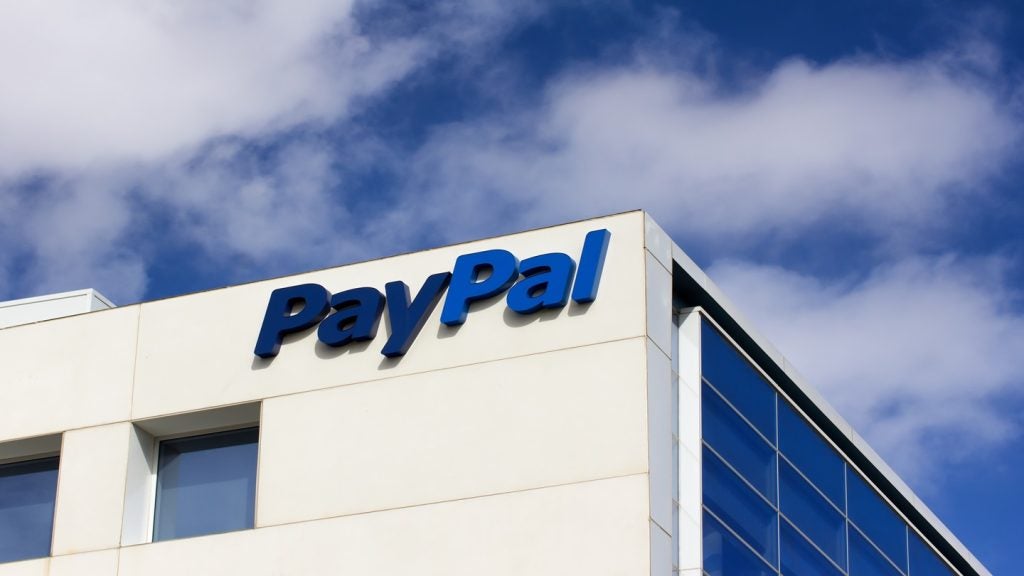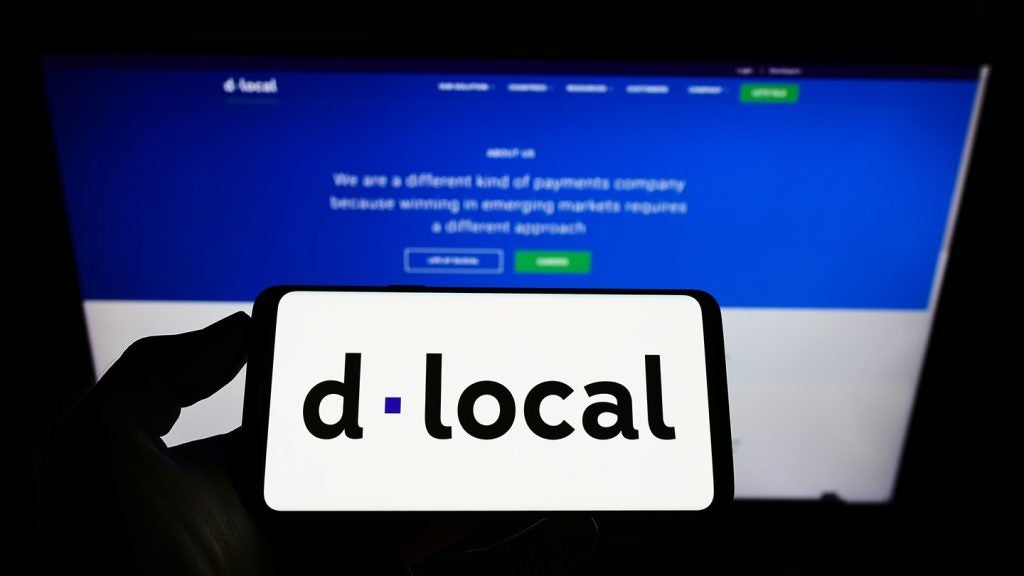In an age of rapid digitalisation, Payments as a Service (PaaS) has become a fast-track route to payments modernisation, reports Robin Arnfield
Fintechs, neobanks, PSPs and merchants are turning to PaaS providers to help them extend their geographic reach and gain access to automated payment services at lower costs than those available from banks’ legacy systems.
How well do you really know your competitors?
Access the most comprehensive Company Profiles on the market, powered by GlobalData. Save hours of research. Gain competitive edge.

Thank you!
Your download email will arrive shortly
Not ready to buy yet? Download a free sample
We are confident about the unique quality of our Company Profiles. However, we want you to make the most beneficial decision for your business, so we offer a free sample that you can download by submitting the below form
By GlobalDataDrivers for digital payments growth include real-time payment schemes, open banking, and expansion in e-commerce and the gig economy accelerated by Covid-19.
Using a cloud-based platform provided by a PaaS vendor can generate cost-savings versus the expense and complexity of purchasing or developing in-house payments systems. This is particularly the case with open banking payments, which are emerging as an important payment method in the UK and Europe.
The one-stop shop PaaS platform
A one-stop-shop PaaS platform handles the operational, regulatory compliance and technology requirements related to payment processing for banks, fintechs, merchants and PSPs, freeing them to focus on core business activities rather than on payments technology.
PaaS providers include Netherlands-based Adyen, US-based FIS, and UK-based Contis, Modulr and Tribe Payments. Services provided by PaaS vendors include card issuing and processing, digital wallets, domestic and cross-border bank payments, instalment loans, account pay-outs and refunds, and links to accounting platforms.
To deliver a wider range of services to their customers, PaaS providers may partner with other firms such as open banking API developers or banking-as-a-service vendors such as Starling Bank, Railsbank and ClearBank.
Open banking providers
Through partnerships with open banking API vendors such as Sweden’s Tink and the UK’s Token, TrueLayer and Yapily, PaaS providers are facilitating the adoption of open banking payments by UK and European PSPs and merchants.
These vendors help PSPs and merchants expand across Europe through their extensive open banking API connections to European banks, fintechs and third-party providers (TPPs) plus links to schemes such as SEPA Instant and the UK’s Faster Payments.
Open banking payments initiation generates significant cost-savings for businesses compared to accepting cards. “For consumers, open banking payments initiation provides a better experience, as they don’t need to remember their card details,” says Ossama Soliman, UK-based TrueLayer’s Chief Product Officer.
“Payments are instantly authenticated with Face ID or a fingerprint on the customer’s mobile device. They never need to update stored details if their card is lost, stolen or expires because, with open banking payments, merchants don’t see their private information.”
Token-connectivity to over 3,000 banks
Token, which has connectivity to over 3,000 European banks, is driving the shift from traditional payment methods to bank account-to-bank account (A2A) payments in the UK and across Europe, says Todd Clyde, Token’s CEO.
“Using Token’s API, A2A payments can be initiated in real-time directly from merchant apps and websites. Banks and PSPs can white-label Token’s payments platform to launch their own open banking payments services for peer-to-peer, consumer-to-business or B2B payments.”
In March 2021, France’s BNP Paribas partnered with Token to launch BNP Paribas Instanea, an instant payments initiation service for merchants across Europe.
“BNP Paribas saw the opportunity for a solution combining PSD2-compliant APIs with SEPA Instant payments to allow e-commerce merchants to accept real-time A2A payments,” Clyde says. “It selected Token as a partner due to our connections to almost 100 French banks representing about 80% of payments accounts in France.”
PayDirect
TrueLayer operates the PayDirect PaaS platform offering instant payments initiated via its open banking technology. Use cases for PayDirect include e-commerce checkouts and fund transfers on marketplaces and wealth management platforms.
“PayDirect offers a digitally-native payment method combining the low cost of bank transfers and the convenience of digital wallets,” says TrueLayer’s Soliman. “It delivers 95%+ transaction success rates and 20-40% higher overall payment conversion than cards.
“The conversion differential between open banking payments and cards is likely to increase in 2021, as many merchants implement workarounds for card payments in order to comply with Strong Customer Authentication requirements. PayDirect is compliant with SCA because it uses biometric authentication.”
PayDirect has very low fraud rates, adds Soliman. “Card-not-present fraud has increased significantly, and e-commerce retailers are facing mounting costs from transaction fees and chargebacks. PayDirect payments are authenticated directly with the bank and biometrically with the payer, significantly reducing fraud risk and saving businesses around 0.5- 1% of revenues.”
TrueLayer PayDirect
Use cases
Account verification – instantly verify account ownership based on what’s on file at the bank. Accelerate your KYC and AML processes.
Account top-up – let users initiate payments or move money between accounts effortlessly.
Instant withdrawals – enable users to initiate payments in a few clicks, with no need to enter account numbers or IBANs.
Instant refunds – allow customers to access their money faster, compared with up to 10 days using cards.
Online payments – seamless online payments that reduce fraud and chargebacks at any checkout.
Applications include:
E-commerce – improve conversion, reduce cart abandonment, and eliminate fraud.
Marketplaces – verify merchants without compromising their experience and enable instant payments.
WealthTech – get money to market faster, enhance security, and reduce costs.
Account pay-outs
PaaS providers can enable their clients to perform pay-outs to businesses and consumers through connectivity to bank networks.
As well as instant pay-ins, PayDirect offers instant refunds in seconds to the same bank account used to make a purchase via the fastest available payment rails, TrueLayer’s Soliman says. “Refunds, which aren’t mandated under current EU or UK open banking regulations, are the missing piece of the puzzle to ensure that open banking payments really work.”
In November 2020, European PaaS platform Contis partnered with Token to enable Token’s merchant, digital wallet provider and PSP clients to perform account pay-outs and refunds using Faster Payments and SEPA.
In addition, Contis’ corporate clients which provide services to businesses and consumers, can use Token’s open banking A2A payments initiation and data aggregation services.
“Through our partnership with Token and access to its open banking APIs, we can provide our clients with account information from external accounts, as well as payment instructions and requests,” says Andrea Ramoino, Chief Strategy Officer at Contis. “Our clients can manage their wider finances from one dashboard, and also deliver this functionality to their end-customers.”
Modulr
UK-based PaaS provider Modulr enables businesses to automate pay-outs and embed payments into their platforms. It provides accounts with IBANs for use by businesses and their suppliers.
UK accounting platform My Digital uses Modulr’s APIs to provide automated payroll services for UK contract workers. The cloud-based payroll service is targeted at employers, accountants and umbrella companies serving the contractor market.
“My Digital’s software performs the calculations about how much payroll to pay on behalf of each client,” says Tom Kelly, Modulr’s accountancy and employment services lead. “It submits that data into the Modulr platform along with details of how much to pay to whom and into what bank accounts the funds should go.”
Once a My Digital client has funded its Modulr account and authorised the payroll pay-outs, Modulr carries out the designated payments.
Modulr can process bulk payments involving hundreds of transactions on behalf of My Digital’s clients, adds Kelly. The joint My Digital/Modulr platform eliminates the requirement for employers to manually download payroll files from their accounting system, upload them to their bank, manually set up bank payments, and update their accounting system.
“Modulr has much lower fees than banks charge for providing payroll services,” says Daniel Moss, Head of Product at My Digital.
In April 2021, FIS Ventures, the corporate venture arm of FIS, invested in Modulr. FIS intends to use Modulr’s payments infrastructure to facilitate and automate real-time B2B payments in the UK and Europe.
Payoneer
PaaS provider Payoneer provides cross-border B2B pay-out services for marketplaces, merchants and gig economy contractors. It uses TrueLayer’s open banking payments API to enable UK businesses to pay international contractors and service suppliers from their UK bank accounts in Sterling.
The supplier sends a payment request with an embedded link to Payoneer’s invoice payment page. Once the client has initiated a payment, Payoneer pays the supplier in foreign currency.
“Open banking creates streamlined B2B payments experiences for SMEs, enabling them to benefit from lower fees, faster payments and increased security compared to card payments,” says James Allum, Payoneer’s VP and regional head.
“Using open banking, the payor’s bank account automatically connects to the payee’s account, eliminating the error-prone process of manual bank account data entry. When customers use Payoneer’s open banking service, there are no transaction recalls due to funds being sent to the wrong account. Also, open banking payments increases the number of actually paid Payoneer customer GBP invoices by 9%.”
Card issuing
PaaS providers can help neobanks and fintechs enter the financial services market through their card issuing and processing services.
UK-based Tribe Payments provides a PaaS platform including issuer-processing to banks, fintechs and payments companies which offer financial services to consumer and business customers.
In May 2021, Tribe partnered with Sweden-based Tink. The partnership will enable Tribe to combine its issuer and acquirer services with payment initiation services (PIS) – load/unload, money transfer and Confirmation of Payee services – and account information services (AIS) – account aggregation and financial management – provided by Tink.
“We partnered with Tink to deliver open banking to our clients enabling them to meet their compliance obligations without significant investment,” says Alex Reddish, Tribe’s Chief Commercial Officer.
“These open banking compliance requirements include account licencing and costs for delivering AIS/PIS services as well as validation and verification of inbound payment and account information requests from TPPs. By aggregating Tink’s services within Tribe’s platform, our clients benefit from a single commercial framework and the ability to accommodate all payment types from cards, alternative payment methods to open banking.”
Rafa Plantier, Tink’s Head of UK and Ireland, says that Tink’s focus is on building the infrastructure for open banking payments which is needed by PSPs to integrate PIS. “It’s our aim to be the backbone of PSPs across Europe, helping them to offer inclusive, streamlined, fast-settlement, low-cost payments solutions.”
In June 2021 Visa announced plans to acquire Tink for €1.8 billion, indicating the importance of the open banking market.
Embedded payments
One form of PaaS involves providing embedded in-app payments for ride-sharing app providers, social media platforms and online retailers.
Singapore-based ride-hailing and food delivery service Grab has embedded payments and its own wallet into its app using Adyen’s PaaS platform, which provides e-commerce, mobile and POS payments.
Invoice payments and cash management
Open banking technology enables PaaS providers to offer SMEs invoice payment services that are integrated with accounting platforms such as QuickBooks, Sage and Xero for invoice reconciliation.
NatWest operates Payit, an open banking payment service, which enables users to pay invoices and e-commerce purchases from their bank accounts.
UK-based FreeAgent has embedded Payit in its SME accounting platform. “Integrating Payit directly into FreeAgent helps SMEs to manage their finances by eliminating manual administrative tasks and allowing customers to pay and reconcile bills seamlessly,” says Kevin McCallum, FreeAgent’s Chief Commercial Officer.
In June 2021, Yapily launched an open banking-based bulk B2B payments service. Yapily said the service enables SME accounting platforms to initiate bulk invoice payments on behalf of their clients from within their accounting packages.
iwocaPay
The iwocaPay B2B invoicing and business financing service from UK-based iwoca enables UK businesses to get paid immediately while giving their customers the option to pay upfront through TrueLayer’s open banking payment API or spread the cost over 90 days.
“Open banking helps iwocaPay solve a problem that blighted small business owners long before the pandemic, but became critical during it: getting paid on time,” says Lara Gilman, iwocaPay’s co-lead. “iwocaPay enables businesses to transform their invoices into checkouts, with TrueLayer providing its payments initiation API so clients can make instant upfront payments from their bank accounts via Faster Payments if they select the Pay Now option.”
“We don’t have to chase invoices or reconcile payments,” says Alun Williams, owner of iwocaPay user Arfon Consulting. “I just send the invoice from the Xero accountancy platform, and the client clicks on the iwocaPay button and checks out. Within 20 minutes, I’m notified by my bank saying I’ve been paid. I then log into Xero and see that the payment and invoice have been reconciled and sorted.”
AccessPay
Treasury management and corporate payments service AccessPay offers cloud-based payments from its clients’ finance systems to UK and international payment networks such as BACS, SWIFT, SEPA, Faster Payments, and Direct Debit.
AccessPay uses Yapily’s open banking APIs for cash management, account aggregation and statement retrievals for its UK clients’ business bank accounts. Currently, AccessPay’s corporate payment service doesn’t use open banking technology.
“Open banking has democratized cash management; it’s now available to businesses of all sizes,” says AccessPay product owner Vijay Gamana. “For international payments, there’s a cost-saving benefit for customers using open banking because of how expensive SWIFT statement files are.”
Open banking requires no banking fees, and users can obtain transaction and balance data on demand, giving immediate visibility of their cash, said Gamana. There’s no need to download statement data from banking portals to create spreadsheets for manual reconciliation.
Bill payments
PaaS providers can provide businesses with request to pay bill payment services.
London-based Ordo provides open banking-based billing services enabling UK businesses to send their customers requests for payment. The customer receives a secure weblink or text message from which they can authorise payment directly from their own bank account using Yapily’s payments initiation technology. Ordo then transfers funds directly and instantly from the customer’s bank account to the business’s bank account.
“Billers tell Ordo into which accounts they want their customers’ payments to go,” says Craig Tillotson, Ordo’s CEO. “We link to billers’ bank accounts via our open banking-based account information services API.”
Ordo charges a small, fixed fee per payment, which is cheaper than the fees paid for card payments, adds Tillotson.
“Ordo gives the biller in real time the status of their request and payment. Billers are guaranteed that payments received into their bank account carry the reference they provided in the original request so they don’t have to perform complex reconciliation processes. The biller’s customers know exactly who they are paying, as they don’t have to type in the biller’s details and try and pass a Confirmation of Payee screen. Nor do they share any of their payments details with the biller or with Ordo.”
Lending
PaaS providers can enable SMEs to share their financial data with lenders via open banking APIs.
For example, UK-based open banking technology firm Codat provides lenders with access to SMEs’ e-commerce and POS data by integrating with payments companies such as Zettle, Stripe and Square. Codat also uses open banking APIs to provide lenders with access to SMEs’ accounting systems and banking transactions.








